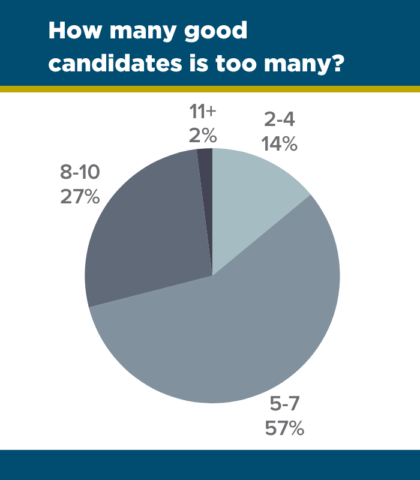Sometimes I get too many good candidates in a search.
By good, I mean candidates who, after at least one interview, seem like that they have strong potential to be a winning hire. Some of these candidates could be great—you just don’t know yet!

Results from Bill’s poll on LinkedIn
To gather insight on this topic, I asked my LinkedIn network “how many is too many good candidates?” Those results are here:
Of course, “too many” is a good problem – more options, more credibility for stakeholders, and more ability to negotiate. And with a larger pool of qualified candidates, it’s more likely that your goals for diversity will be addressed. Still, the need to treat all candidates fairly and thoroughly may feel overwhelming or frustrate candidates if the process drags on.
Regardless of how many candidates strikes you as too many, there are steps you can take to effectively manage the process. Here are 5 tools from my toolbox that I have used that you may want to consider:
1. Buy time with clear communication
When you are juggling internal and candidate schedules to get an interview on the books with the right people, it might be time to extend the search. The best course of action in any search is clear communication. In this case, clearly communicate to candidates about the extension and their standing in the search. Maintaining good relationships even with candidates who aren’t right for the position will benefit everyone.
2. Hire right away
Yes, this is totally opposed from “buy time.” But hear me out: why not hire right away? If you need to urgently fill a position, there is no sense is wasting time. If you are a confident and knowledgeable hiring manager who needs someone to fill the role right away, trust that the candidates who have risen to the top of the list during the search could each do the job well and extend an offer to one of them.
3. Hire 2 or more
Sometimes the best decision is to not make one at all—especially between two exceptional candidates. Depending on the scope and responsibilities of the position, two hires could be better than one. If it fits the budget and goals, consider creating a new position or moving up plans to expand.
4. Recalibrate
It may be that you received a lot of good candidates, but no great candidates—candidates who fit some qualifications but lack experience, for example. You might need to make the criteria more stringent when filtering candidates.
On the other hand, you may find that you can get a great candidate at the low end or below your salary range. For both situations, it’s probably time to rethink what you consider to be the ideal candidate.
5. Bottle the Magic
It’s time to reflect on your process. Why do you have so many good candidates? Was it your research? Employment brand? Social media strategy? Whatever you did right, know what you did and do it again!
Sifting through “too many” good candidates to find a great one is part of the job as a recruiter, and I have only just scratched the surface with these tips. If you have suggestions, questions, or feedback, please reach out to me at wweber@developmentguild.com.



